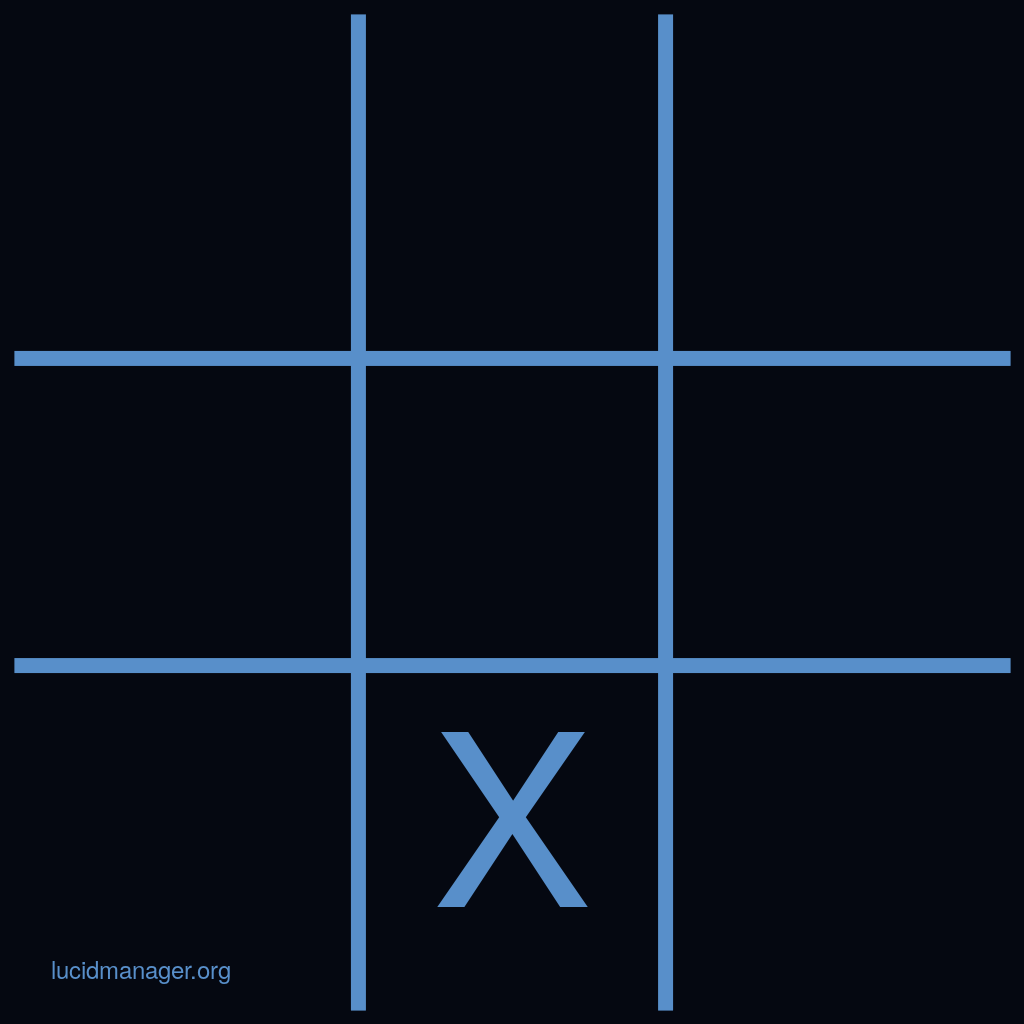OPTIONAL THEME:
KNOWLEDGE AND TECHNOLOGY
CHESS ALGORITHM—ALPHAZERO
1. e3(or e4) [...]
2. Bc4 [...]
3. Qf3 [...]
4. Qxf7++
CLASS ACTIVITY I: CHECKMATE IN FOUR MOVES
This coded message above is the conventional way of writing checkmate in four moves in the game of chess. All good chess players know how to guard against this ploy. There is likely to be a good chess player in the TOK class who should be invited to explain the principles of standard “algebraic notation” and to demonstrate the sequence of moves live, using a real chess board.
CLASS ACTIVITY II: tic-tac-toe ALGORITHM
Next, students should find a partner and get ready to play tic-tac-toe (noughts and crosses) for at least five minutes. Using pencil and paper as the did as children. When the time is up, ask if anyone is unbeaten? Announce that the next task is to formulate a succinct algorithm (rule) that, if implemented tirelessly, will ensure that a player never loses at tic-tac-toe.
Next, after all the hands-on fun, it is time for some collective critical thinking. Combine the playing pairs in groups of four to tackle the following questions:
GENERATIVE QUESTIONS:
In what other ways could checkmate in four moves be described?
To what extent is the game of chess a mathematical algorithm?
Is it possible to create an algorithm for chess that would ensure that a player never loses (analogous the one we just attempted for tic-tac-toe*)? Explain your response.
No machine could beat a chess master until IBM's Deep Blue beat Garry Kasparov under standard tournament time controls in 1997. What advantages do you think the supercomputer had over the human brain?
*Inform students that the tic-tac-toe gif featured above always ends in a draw!
Deep Blue: a silicon-based chess master?
CLASS ACTIVITY III:
FROM DEEP BLUE TO ALPHAZERO
Show this AlphaZero video made by DeepMind ceremoniously to the class. Warn students to pay close attention and brace themselves to be astonished. Mention that the concept “perfect information game” arises in the video and you will be asking them about its meaning, and its relevance to the previous chess and tic-tac-toe activities.
Students in the class with computer science aspirations may be interested in the original Alpha Zero journal article:
Next, reinforce the message in the AlphaZero video with a public reading of the following extract from Yuval Noah Harari’s 2018 article from The Atlantic—Why Technology Favors Tyranny. Begin by a silent solo reading. Then extract 8 volunteers, to read each of the 8 paragraphs. Spoiler: one of the lucky readers will be assigned a two word paragraph!
Then conclude the unit by grappling with the three discomforting generative questions as a class.
“...as AI continues to improve, even jobs that demand high intelligence and creativity might gradually disappear. The world of chess serves as an example of where things might be heading.
For several years after IBM’s computer Deep Blue defeated Garry Kasparov in 1997, human chess players still flourished; AI was used to train human prodigies, and teams composed of humans plus computers proved superior to computers playing alone.
Yet in recent years, computers have become so good at playing chess that their human collaborators have lost their value and might soon become entirely irrelevant. On December 6, 2017, another crucial milestone was reached when Google’s AlphaZero program defeated the Stockfish 8 program.
Stockfish 8 had won a world computer chess championship in 2016. It had access to centuries of accumulated human experience in chess, as well as decades of computer experience. By contrast, AlphaZero had not been taught any chess strategies by its human creators—not even standard openings. Rather, it used the latest machine-learning principles to teach itself chess by playing against itself. Nevertheless, out of 100 games that the novice AlphaZero played against Stockfish 8, AlphaZero won 28 and tied 72—it didn’t lose once…
Can you guess how long AlphaZero spent learning chess from scratch, preparing for the match against Stockfish 8, and developing its genius instincts?
Four hours.
For centuries, chess was considered one of the crowning glories of human intelligence. AlphaZero went from utter ignorance to creative mastery in four hours, without the help of any human guide.
So if chess is our canary in the coal mine, we have been duly warned that the canary is dying. What is happening today to human-AI teams in chess might happen down the road to human-AI teams in policing, medicine, banking, and many other fields.
”
GENERATIVE QUESTIONS
1. Explain the “canary in the coal mine” metaphor.
2. What would AI policing, medicine and banking look like? To what extent is it already happening?
3. What might be some of the long term societal implications for AI replacing human workers on a large scale?
Rows of Google second generation TPUs (Tensor Processing Units) AlphaZero was trained by "self-play" using 5,000 first-generation TPUs to generate the games and 64 second-generation TPUs to train the neural networks.
CODA: BLACK BOX BOTS
Thanks are due to TOK student, Cole Lameyer who shared this YouTube video that reveals some of the black box aspects of creating algorithms and how bots learn.



